 Petzlover
Petzlover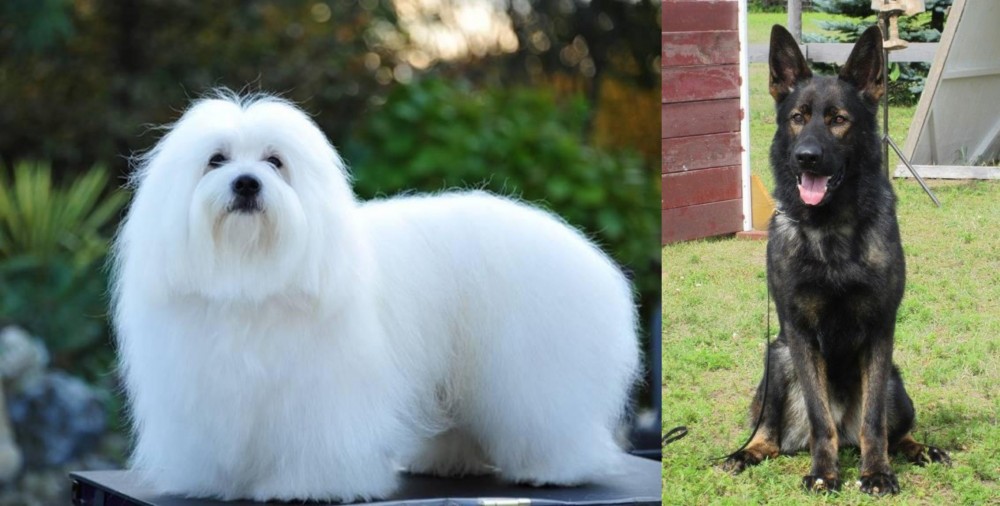 Coton De Tulear is originated from Madagascar but East German Shepherd is originated from Germany. Coton De Tulear may grow 35 cm / 13 inches shorter than East German Shepherd. Coton De Tulear may weigh 34 kg / 74 pounds lesser than East German Shepherd. Coton De Tulear may live 3 years more than East German Shepherd. Coton De Tulear may have less litter size than East German Shepherd. Coton De Tulear requires Low Maintenance. But East German Shepherd requires High Maintenance
Coton De Tulear is originated from Madagascar but East German Shepherd is originated from Germany. Coton De Tulear may grow 35 cm / 13 inches shorter than East German Shepherd. Coton De Tulear may weigh 34 kg / 74 pounds lesser than East German Shepherd. Coton De Tulear may live 3 years more than East German Shepherd. Coton De Tulear may have less litter size than East German Shepherd. Coton De Tulear requires Low Maintenance. But East German Shepherd requires High Maintenance
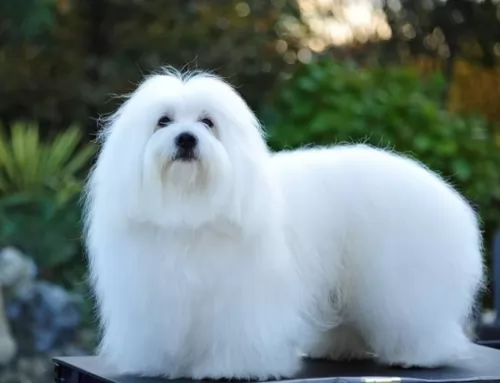 These cute little Coton de Tulear dogs originate from Madagascar and have in fact been named the ‘official dog of Madagascar’.
These cute little Coton de Tulear dogs originate from Madagascar and have in fact been named the ‘official dog of Madagascar’.
The Coton de Tulear actually takes his name from the seaport city of Tulear. In the 1970s a Frenchman brought a puppy to France, with the idea of establishing them as a breed. It was also at this time that the dogs were brought to North America.
This small fluffy white dog was also found on the island of Malta, becoming known as the Maltese. They were mated with other dogs such as the Barbet, a curly haired dog and other coat colors exist such as apricot, black and white and fawn. Other breedings led to the Barbichon family of dogs which includes the Bichon Bolognese and the Bichon Teneriffe. The modern day breeds are the Maltese and the Coton de Tulear.
As with many dog breeds, there are different tales about the origin of the dogs and one version is that the white cotton-ball type of dog survived a shipwreck off the Madagascar coast.
 The East German Shepherd is a line of the German Shepherd Dog breed. The German Shepherd Dog came about when the three types of “continental shepherd dogs” separated into the Dutch Shephers, German Shepherd and Belgian Shepherd. In the 1800’s it was local shepherds who bred their dogs and selected the traits they needed in their geography. The result was dogs in various local areas who all could herd and guard flocks; who were intelligent, strong, fast and had a good sense of smell, but their appearance and skills varied from town to town.
The changes in Germany from agriculture and sheep to industrial cities rendered the German Sheep Dog obsolete. But was it really? Many felt the dog could be a good working dog in the cities as well but needed some refinement in the breed according to Max von Stephanite. At a dog show in 1899, he found what he wanted – the perfect working dog.Stephanitz bought the dog and founded the Society for the German Shepherd. (Verein fur Deutsch Schaferhunde) Stephanitz is considered the developer of the German Shepherd Dog.
The East German Shepherd is a line of the German Shepherd Dog breed. The German Shepherd Dog came about when the three types of “continental shepherd dogs” separated into the Dutch Shephers, German Shepherd and Belgian Shepherd. In the 1800’s it was local shepherds who bred their dogs and selected the traits they needed in their geography. The result was dogs in various local areas who all could herd and guard flocks; who were intelligent, strong, fast and had a good sense of smell, but their appearance and skills varied from town to town.
The changes in Germany from agriculture and sheep to industrial cities rendered the German Sheep Dog obsolete. But was it really? Many felt the dog could be a good working dog in the cities as well but needed some refinement in the breed according to Max von Stephanite. At a dog show in 1899, he found what he wanted – the perfect working dog.Stephanitz bought the dog and founded the Society for the German Shepherd. (Verein fur Deutsch Schaferhunde) Stephanitz is considered the developer of the German Shepherd Dog.
The East German Shepherd is a line of the same breed. There are several different lines of the German Shepherd Dog, with slight difference for the reason they were bred. For instance, the German Shepherd Dog is bred for looks while the East German Shepherd is bred to be a working dog. Often called a DDR German Shepherd, they came about from the Deutsche Democratic Republic or the Republic of East Germany. For about 40 years in East Germany these dogs were bred only within the DDR bloodline.
The East German Shepherd is stronger, heavier boned, leaner, more muscular and solid. During the time of the Berlin Wall, from 1961-1989, there were few German Shepherds for breeding stock on either side of the wall, but especially in the East. There the government controlled the development of the breed. They developed a separate registry for the DDR – East German Shepherd. With such strict standards for a perfect working dog and such little breeding stock, the only dogs allowed to reproduce were the ones that passed a rigorous test and were deemed perfect working dogs.
In West Germany they continued to breed for appearance. The West German Shepherd are the most popular ones and are usually simply called German Shepherds. The show dogs of today and the American line came from the West.
Preserving the East German Shepherd today is important and difficult. It means preserving not improving. The Strength of the East German Shepherd is their body line and style, Today’s breeder must maintain this while making sure there is enough diversity in the gene pool to keep the line healthy without losing its body style and working temperament. It is important that the East German Shepherd have a straight back rather than the sloping one of the German Shepherd Dog or the American lines of the GSD. The working dog is also more aggressive and has a much higher work drive than any of the other German Shepherd Dogs lines.
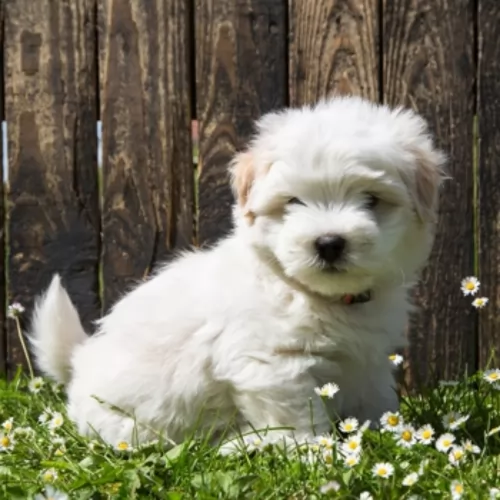 These little dogs make perfect companions. They stand about 25–30cm with the female sometimes being slightly smaller. They weigh anything between 3 – 6kg. They’re robust little canines and can live up to 19 years or so when looked after well.
These little dogs make perfect companions. They stand about 25–30cm with the female sometimes being slightly smaller. They weigh anything between 3 – 6kg. They’re robust little canines and can live up to 19 years or so when looked after well.
The Coton de Tulear is easily recognized because of his soft, fluffy coat. Many people take their dogs to the dog salon to have him washed and his hair trimmed. His legs are short and straight as well as being muscled under the hair. The ears are floppy and the tail of the Coton de Tulear is carried straight or slightly curved.
The Coton de Tulear is a friendly, affectionate dog who has a gentle, cuddly side to him. They are social dogs and get on well with their human family and with the children in the home, loving the games they provide.
He will also get on well with other pets in the home and becomes amicable, relaxed and obedient with socialization and training. Small though he is, he makes a great watchdog too and is full of tricks, making him an entertaining pet to have around.
 What are the differences between the German Shepherd Dog (GSD) and the East German Shepherd? The East German Shepherd has a straight back and a larger bone structure. He has a very large and block shaped head with a lean, athletic build. His lips are taunt and dark, and his nose must be black. He has a scissor bite and strong teeth. His eyes are medium sized almonds that are slanted slightly. The eyes are also very dark. His ears are erect and not too big. His legs, haunches and feet must all be coordinated so that he trots rather than runs.
What are the differences between the German Shepherd Dog (GSD) and the East German Shepherd? The East German Shepherd has a straight back and a larger bone structure. He has a very large and block shaped head with a lean, athletic build. His lips are taunt and dark, and his nose must be black. He has a scissor bite and strong teeth. His eyes are medium sized almonds that are slanted slightly. The eyes are also very dark. His ears are erect and not too big. His legs, haunches and feet must all be coordinated so that he trots rather than runs.
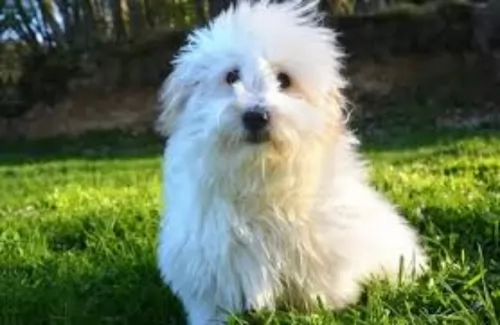 The Coton de Tulear just wants to please his human family and spend unforgettable moments with them, hating to be separated from them. He is such an adaptable little dog and will fit well into city- as well as country life.
The Coton de Tulear just wants to please his human family and spend unforgettable moments with them, hating to be separated from them. He is such an adaptable little dog and will fit well into city- as well as country life.
He is smart, comical, playful, independent and fun to have around as he is known for his clownish personality. Treat him well and he’ll repay you with plenty of love and loyalty.
 The East German Shepherd is a well- balanced dog. He is sure of himself, friendly, loyal and wants to please his owner. He is intelligent, resilient and attentive. He will make a great family pet. He is aggressive with a high prey drive but that can be tempered with good socialization and training. He is easy to train.
The East German Shepherd is a well- balanced dog. He is sure of himself, friendly, loyal and wants to please his owner. He is intelligent, resilient and attentive. He will make a great family pet. He is aggressive with a high prey drive but that can be tempered with good socialization and training. He is easy to train.
 With proper care, your Coton can reach a ripe old age of 15 – 20 years of age. However, even this robust little dog will need to be watched, as he can fell prey to some common dog ailments -
With proper care, your Coton can reach a ripe old age of 15 – 20 years of age. However, even this robust little dog will need to be watched, as he can fell prey to some common dog ailments -
Bad Breath with your pet can be a sign of dental decay. Dental plaque for instance, caused by bacteria, can give your pet a terrible breath. It is important to brush your pet’s teeth 2 or 3x a week. Your vet can provide tips on how to brush your pet’s teeth with a special canine toothbrush and toothpaste.
Other things to look out for are hip dysplasia and chronic allergies. Allergies can cause itchy and dry skin as well as ear infections because of so much hair being in the ear canal. Speak to your vet about how to clean your pet's ears to avoid ear infection.
 Because the East German Shepherd line has been isolated behind the Berlin Wall, there are not many genetic health issues in the line. Most importantly the East German Shepherd shows no hip dysplasia which plagues most GSD. There are a couple of situations to look out for. They are:
Because the East German Shepherd line has been isolated behind the Berlin Wall, there are not many genetic health issues in the line. Most importantly the East German Shepherd shows no hip dysplasia which plagues most GSD. There are a couple of situations to look out for. They are:
A life threatening issue that must be addressed immediately for fear of death. Bloat is caused when a larger dog with a deep chest eats too large a meal before or after strenuous exercise, eats too fast, or drinks too much water. The stomach distends with air or gas and twists. Sometimes it is completely inverted. Get help fast or your dog will die.
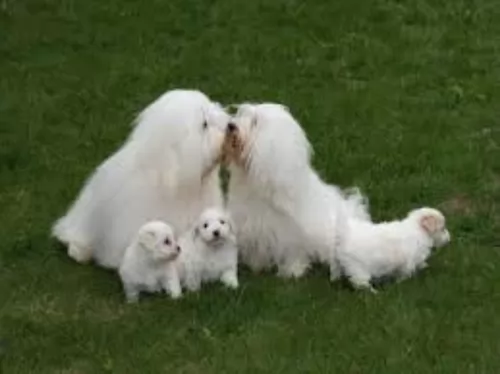 Coton de Tulears will need some exercise if you want him to remain lean and fit. It is important to provide exercise and games for your dog to prevent boredom. Activity levels for any dog, including the Coton, will depend on his age and health.
Coton de Tulears will need some exercise if you want him to remain lean and fit. It is important to provide exercise and games for your dog to prevent boredom. Activity levels for any dog, including the Coton, will depend on his age and health.
A walk every day and some ball games will keep your pet happy and prevent him from resorting to destructive behavior from sheer boredom and frustration.
The long coat will require some careful grooming and you will need to be on the lookout for excess hair around the paws and in the ears.
He is not a great shedder and brushing twice a week will remove loose hairs and provides the perfect opportunity to check for fleas and ticks.
Just like any other dog, your Coton de Tulear will need a warm, dry place to sleep. If you haven’t already invested in a doggy basket or dog bed, you can use a cardboard box for now, before making up your mind what you want for your pet.
A well behaved, obedient dog is a pleasure for everyone, and training and socialization is important, even for a small dog. Your dog will understand simple commands such as ‘sit’, ‘down’ and ‘come’ and also know how to walk well on a leash.
 Because these dogs were bred to work you need to feed them a high quality dry food, made for working dogs. It needs to have a good amount of calcium and glucosamine. Feed about 3-4 cups per day divided into 2 feeding times.
Because these dogs were bred to work you need to feed them a high quality dry food, made for working dogs. It needs to have a good amount of calcium and glucosamine. Feed about 3-4 cups per day divided into 2 feeding times.
In addition to bloat as mentioned above, the East German Shepherd can also have both air born, and food born allergies. These are easily treated by your veterinarian.
The East German Shepherd is a high energy, high activity dog so you have some for him. He is agile and athletic. He needs serious exercise and a job is essential. If you can’t give an East German Shepherd a job, then don’t get this dog. He loves tracking and has a high prey drive. Keep him trained, challenged and working. Try tracking and herding trials, obedience, agility, fly ball and bar hunt.